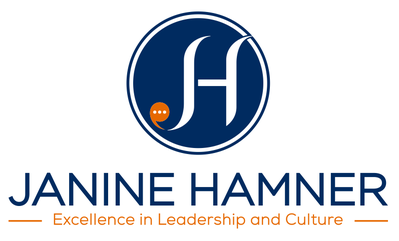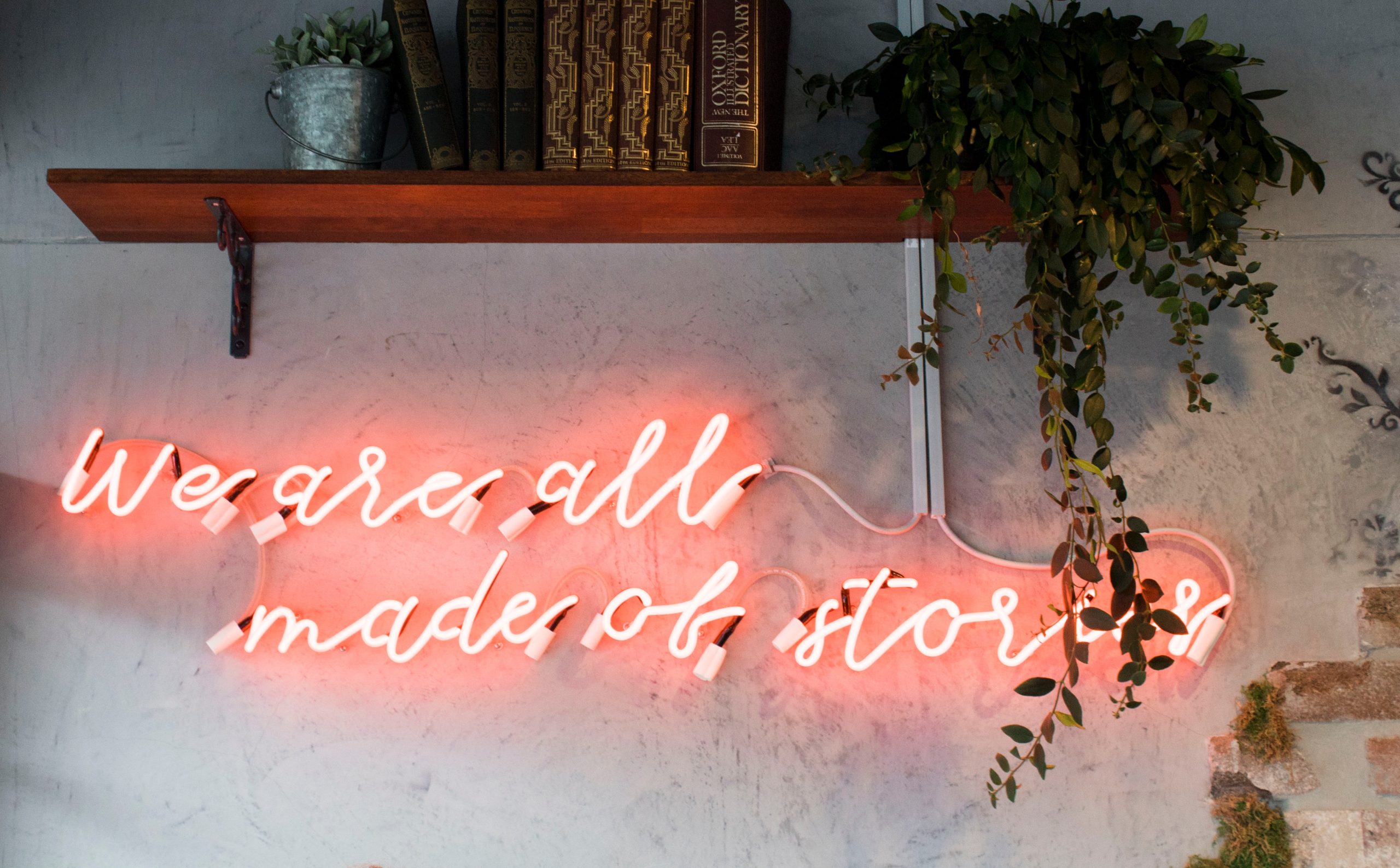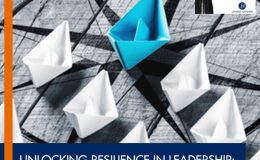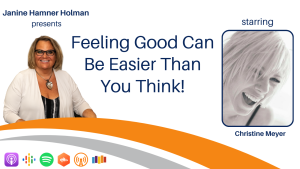
How much time do you spend thinking about the story of where your life is going? Do you feel in control of that narrative? In this episode, Janine Hamner Holman sits down with Dr. Christine Meyer, an executive life and leadership coach, to discuss the way we frame our lives with the narratives we tell about ourselves.
GUEST: Christine Meyer | LinkedIn, Instagram, Facebook
HOST: Janine Hamner Holman | Janine@JandJCG.com | LinkedIn, Facebook, Instagram
What am I paying attention to today? There’s an idea of the middle way, which comes out of the Buddhist tradition. It’s about working to be free of a one-sided perspective, finding the path between two different things we think of as opposite. There are two ways this is showing up in my life, even today alone.
One is this idea of being committed and unattached, which I will tell you, is super challenging for me because when I get committed to things, I tend to also get attached to the outcome. I want it to turn out a certain way. When we are committed and unattached, we can be fully committed to a goal.
As anybody who’s been reading this blog for a while knows, I am on a mission to have the world of work be one in which everyone can thrive. I can be 100% committed to that goal, that big picture, and yet be unattached essentially to the how.
I can get attached to a client or a project. Sometimes that one client or project doesn’t quite work out in the way we think it will. I am living into, and honestly also struggling a bit, with this idea of being fully committed and yet unattached.
The other place this idea is showing up is, I had the opportunity right before I hopped onto this podcast to write my newsletter intro for this month. As many of you may be aware, June is Pride Month. I wanted to write something about Pride Month. The newsletter begins with, “There’s an old curse, ‘may you live in interesting times,’” and we’re living in really interesting times.
As I was writing it, I was doing some research. The folks at Gallup released a poll about a year ago that said 70% of Americans, including 55% of Republicans, support same-sex marriage. Yay.
Here we are almost at the midway point in 2023. As tracked by our friends at the Associated Press, there have been nearly 500 anti-LGBTQIA+ bills introduced in state legislatures across the nation.
These are two polar ideas that we can support same-sex marriage. There was a survey done just a couple of years ago by the folks at Proctor and Gamble that found 75% of people who do not identify as LGBTQIA+, and that’s a super majority of people, 75% of people who do not identify as gay and that whole wonderful listing, are totally comfortable with seeing folks who are not straight as part of marketing campaigns.
These are such different ideas. On the one hand, we’re happy, us people, being inclusive and on the other hand, almost 500 anti-LGBTQIA+ bills were introduced in state legislatures. Throughout that article, I was struggling with how we find the middle way.
For humans, most of us don’t like change. It feels like in the world today, things are changing fast and that can be scary for some people. I can get that. I can be with that. One of the things that has always been so great about Pride Month is that it is this joyful, inclusive, and generous celebration. How do we get back to that idea of joyfully being together and being in a country at the moment where things feel so polarized?
It occurred to me while I was in the process of writing all of this, that maybe I was also overthinking things. That’s my direct connection to our guest for today. I’m so excited to have Christine Meyer here on the show with us. Christine is an executive life and leadership coach. She’s the author of this really great book called Keep It Simple, Smarty Pants!: Stop Overthinking, Start Aligning, Live Happy.
She coaches super successful people to dream even bigger, to reach beyond their limitations and allow themselves to move inside out, to create a life that makes them happy and confident, while also making the impact they are up to in the world.
Her clients include Obama speech writers and impact-driven serial entrepreneurs, Emmy award winners, bestselling authors, multi-million dollar investors, founders of nonprofits and for-profit companies alike, radio personalities, professionals, and leaders of change.
She’s a founding member and a regular contributor to the Forbes Coaches Council and her second book in her Keep It Simple, Smarty Pants series will be out next year. Welcome to the show, Christine.
Thank you for having me. That was a great introduction and a great beginning conversation.
Thank you. I’m so excited you’re here and nothing is an accident, so I’m so excited you’re here with me today. I’m going to ask you the question I ask almost everybody at the beginning of the show, which is, what is something you have become aware of that we are not paying enough attention to either consciously or unconsciously? What’s the cost of that inattention?
Many people don’t pay attention to what they’re thinking, feeling, and speaking about, and the cost or result of that is, you are always creating your life in thought, word, and vibration, if you will. You are always creating the life you are about to walk into. It’s like making a future reservation. I think that people lack awareness, and that’s not diminishing anyone.
Most people do not comprehend the power they have to affect the life they’re living and that they’re going to walk into in some future moment. The cost of that is, we live lives that feel less than happy, less than joyful, less than fulfilling, less than meaningful, and we feel more diminished than who we truly are. We perpetuate it by talking about it with other people.
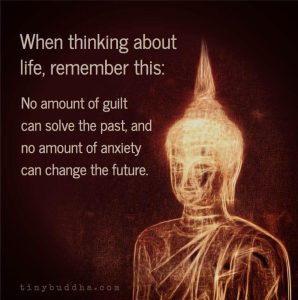
We perpetuate it by bonding with other people in those moments. I’m not saying don’t have those conversations. What I am offering here is the idea that, if you knew your thoughts are always creating your reality and that this conversation you’re having right now, this thought you’re having right now is perpetuating a reality and creating a future reality you’re going to walk into, would you change the subject? Would you be more intentional with the direction of the conversation and the stories that you’re telling?
We all tell stories that do not serve us. The flip side of that is, every time you do talk and think something that is diminishing you in some way, or something that you don’t want more of, you are creating more clarity for yourself about what you do want, whether you know it in that moment or not.
I’d like to speak to something else you said earlier about conscious or unconscious. I’d like to clarify that I think of conscious and unconscious is, if you’re having a thought and you’re having a feeling response to it, it is conscious and it is a player in your reality. It is, at the moment, creating a future reality and consequence.
If it’s unconscious, meaning you’re not having much of an emotional response to the thought, then it’s not a big player in your reality and you don’t have to be concerned about it. There’s nothing that’s happening that is very unconscious for most of us. We might be oblivious, but for the most part, it is not unconscious.
I want to dig into that a little bit more. We might be oblivious. Tell me more about that.
Many of us are not paying attention to how we feel, or understanding the messages our emotions are providing for us. When we think something and have a feeling response, we think it’s true, or we don’t pay attention to the feeling response, and we just rampage. We go on a rant of anger or frustration. It’s along the lines of, if you were to get in your car and say, “I want to go to San Francisco.” That rant is equivalent to getting in your car and going in the opposite direction of San Francisco.
Most people are not aware of how their thoughts create and their emotions indicate which direction they’re going. Whether they’re opposing their desire, their dreams, their intentions, or whether they’re aligning with all of those things.
Let’s bring into this conversation the idea, we are not just human beings, we are not simply in physical form here. We are also souls. We all have these non-physical partners, many, in fact, with us. I don’t want that to sound too woo-woo, but that is part of who we all are. We are not just human beings having a physical experience. We are also souls having the experience through the physical.
When you don’t understand that relationship, it makes you more oblivious. It does make your life feel more random. The cost of not knowing this is that you think your life is being created for you.
Or that you’re a victim of what’s happening.
It’s the idea that your life is happening to you, not from you, right? That is never the case. Your life is always happening from you. I’m not saying you’re going to like everything you are creating, nor do you have to. This message is not about saying, once you know this stuff, you’re going to create the perfect outcomes, the perfect end results, and to your point earlier, the perfect path, that’s not the point.
You’re here to create, but isn’t it lovely if you are on the way to creation and you know what you’re in the process of creating, which way you’re pointing, if you wanted to go to San Francisco, wouldn’t you like to know that you’re headed toward there, versus not knowing where you are and hoping you get there?
All of this works together to help you understand you are creating your life. You are the creator, and you are also a creation of what you’re creating. You see, you’re creating you, and you’re creating other things as well. It’s helpful to understand how these pieces come together so you can be more deliberate and intentional.
That doesn’t mean you get all serious about creating your life and take yourself seriously. That just means understanding, so you can navigate. If you don’t know where you’re going, and I don’t mean necessarily in specifics here. I did use a specific and say, we’re going to San Francisco.
Just know whether you’re pointing yourself in the direction of or opposing it, and you are opposing it when you bring in those stories about yourself, those expectations you’ve had, saying, “It didn’t work out before. So I don’t know” That doubt, that contradiction. “I want this, but I’ve never had it. I want to build my business income or I want to have 20 employees,” or whatever it is you’ve identified. You contradict it and doubt it, and you look for reasons why it’s not going to work.
Understanding those pieces helps you understand where you are on your journey. The reason you have any goals, any desires at all is for the journey toward them, for the discovery of yourself and everything else you’re going to discover along the way.
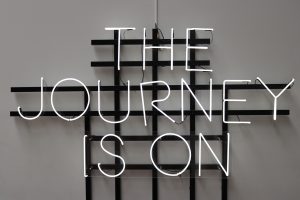
The most satisfied you can be is when you’re enjoying the journey on your way to the inevitable outcomes you want and those inevitable outcomes, when you identify something specific that you want and you feel aligned with it, meaning you’re not contradicting it, you’re not filling that hose full of doubt and crap. That’s really fun.
When you have a desire you have identified specifically and you feel contradictions, you feel doubt, you feel unworthy, you feel whatever those contradictory thoughts might be, that’s not very fun. You’re better off getting into a more general perspective stance and saying, “I just want to feel good.”
Because everything you want, everything that you, I, or anyone identifies as a goal, as a desire, as a dream, all of it is only because of how you think it will have you feel. You will feel fill-in-the-blank when you have it, be it, do it, experience it, kiss it, lick it, whatever. That’s the only reason we have goals and desires to move toward is for the joy along the way, and because we think having it will make us feel a certain way. Why not feel good along the way to it and start establishing those foundations that, whatever it is that you want and have identified, you can experience it?
There’s so much in here I want to unpack. The first place I want to go is one of the places where you started around story. The stories we make up in our head about how we are, how the world is, how other people are, how this one individual is. This is a human brain construct. This is how the brain sorts information. It makes up story.
Sometimes those stories are helpful and positive and sometimes those stories are really not. I had the opportunity last weekend to be up in the Bay Area. I was going to San Francisco, technically I was going to Oakland, for the memorial service of a close friend who had passed away a year ago from cancer. She was way too young. She was just six months older than me, and we had been friends since 1991.
I am a super good crier. You put me in front of a Kleenex commercial, I’m going to cry. I have been in church services celebrating the life of somebody who has died, the service is happening in a language I do not speak, and I cry. I’m really good at feeling the emotions.
I created a whole story about how it was going to be for me to be there based on my expectations and my experience of myself. You put a Clydesdale and a puppy in a commercial, and I will cry. Celebrating the life of my friend who I’ve known for more than 30 years, where her daughters are my goddaughters, I am going to be a big hot mess. Because I’m going to be a big hot mess, I am not going to say anything. I’m sure people are going to be invited to speak, and I am not going to be somebody who speaks.
Then here I was in the service and I cried, but it was like the tears down your face crying as opposed to the sobbing kind of crying, which is the kind I’m really good at. Then one of the people who spoke talked about play and fun. That was my opening to go and talk about play and fun. I knew exactly what I wanted to say.
It was one of those times when you feel called. I felt called to go up and I knew what to say and I knew how I wanted to say it and who I wanted to speak to in the audience. It was great. In the aftermath of it, in driving back down in the six hours it takes to drive from San Francisco to LA, I got to think about the power that story about myself has and how I let it shape my anticipation of what this day… I mean the service lasted for six hours, what the day was going to be like.
It turned out to be something totally different. I’m not sure what it was. Maybe it was this middle way idea. I’m not sure what it was that allowed me, in the moment, to let go of my attachment to the story and let something else come in.
Well, if I may, because it resonated with who you truly are. It caught you in a moment. You had released enough resistance in the moment. That doesn’t mean that story for you doesn’t exist. It means, in that moment you resonated enough with a higher frequency with who you truly are.
When you can find that resonance with who you truly are, those stories that don’t serve you, those stories that limit you, go away in those moments. They’re not in your awareness. They’re not a factor in your experience. But those moments of resonance with who we truly are come and go. It’s not like having a graduation certificate.
You’re an evolving, expanding being, always evolving, always expanding. In that moment, you had released enough resistance to recognize and feel the fullness of who you were, and you were able to step out of your story. Your story did not exist in that moment. If you and I had tried to have a conversation about that story, you would’ve said, “Wait, what?” Then I could have helped you recall it.
In that moment, it was not present. That is a beautiful demonstration of what alignment is, alignment with who you truly are. In those moments, you don’t feel diminished, you don’t feel powerless, you don’t have those stories crawling all over you.
One of the tactics our brain sometimes uses is this idea of overthinking. When I was preparing for today, I found this quote about how much we overthink. 73% of 25 to 35-year-olds chronically overthink.

Maybe it diminishes a little, but it doesn’t go away as we age. 52% of those of us in our mid-forties to mid-fifties are overthinking. Overthinking tends to get us focused on the past or the future, instead of on the present. Is reducing our tendency to overthink part of our opportunity here and connecting it with your book?
Yes, and I want to expand on that because I think of overthinking happening only when you’re not in alignment, when you’re thinking things that feel worrisome, when you feel anxious, and when you’re thinking about something you don’t know the answer to. You keep asking the question, but you don’t know the answer to, what’s going to happen? It’s having a nightmare on purpose into your future.
Pause right there, please. It’s having a nightmare on purpose into your future. That sounds like a terrible plan. I don’t want to have a nightmare on purpose that’s creating my future.
Most of us do that. Maybe not that extreme, but you’re having a recurring nightmare on purpose by dwelling. I like to make that distinction. I only consider it overthinking when it comes from that place of negative emotion, not meaning bad, but negative meaning it doesn’t feel good. Then, it’s rummaging around in this negative overthinking space.
When I’m thinking and feeling good, that doesn’t feel like overthinking. That feels like inspired thought. That feels like fun to think about. That feels like pleasure for the sake of thinking. Think all you want when you feel good.
My rule of thumb is to think all you want when you feel good, think less, and back off when you don’t feel good when. That’s why tying in that understanding of “I’m thinking something and what is my feeling response? How am I feeling as I’m thinking about this?” Maybe I’m contemplating doing this thing or having that conversation. How am I feeling?”
If I’m feeling bad, it is my time to say, “Not now. Maybe later.” What else could I think about that would be more uplifting to me? It could be thinking about my dog, the forest, putting my feet in the ocean, or whatever else that is a positive, peaceful thought.
A lot of people dismiss that and say, “That’s not a very important thought.” My response is, you’re not going to get to the solutions you’re seeking if you keep rummaging in that negative space. If you put your feet in a muddy puddle and you wanted to see your feet, but you kept stirring your feet up, you would never find your feet.
The more you rummage around, the more you play around, the more you sit with thoughts that don’t feel good, the deeper hole you’re digging. You’re going further down that rabbit hole. We all know how much rabbits multiply. There is no bottom to that hole. You will always find more rabbits.
When you are thinking and not feeling good, you’re in the process of creating more nightmares and you’re having one right in that moment. It’s important to pay attention to how you feel and how what you’re thinking feels for you.

It’s not about getting over-analytical about what you’re thinking, and it’s not about criticizing yourself for having those moments. It’s always easier to keep thinking what you’ve been thinking than to think a different thought. That’s because of momentum.
The more you get into the habit of thinking about something chronically, the easier it is to think about it. If you label yourself, “I’m a worrier,” it could be time to start saying, “I’d like to be less of a worrier.” That’s a change. We are talking about stories. That’s a slightly different story. How do you change the stories you’ve been telling yourself all of your life? How do you shift from what you’ve come to know about yourself or expect about yourself and others and your future? How do you shift and tell a different story if it’s been very different from what you’ve wanted or if you’ve had experiences that you didn’t want? You shift them a little bit at a time.
I’d like to believe I don’t have to overthink things. I’d like to believe things are always working in my favor. I’d like to know more about understanding things are for me, not against me. I’d like to think that’s possible. That’s changing a story. If you tell a story, “I’m a crier, I cry,” is that a bothersome story to you or not? Do you like it? Does it bother you?
The only time it bothers me is if I end up feeling self-conscious about it, and if I feel I’m being judged by other people.
That’s a whole other conversation about how other people… it’s always my perspective of your perspective is how I feel, right? People will judge, they’ll look at you and think something.
But that is through their lens. It’s through the lens of their experiences of what they’ve come to know, what they’ve come to believe, and what they’ve come to expect. Someone else’s perspective of you might be accurate based on them standing there, but it’s their shoes. It’s not your shoes.
I’ll tell you a story about me. I hate tech. Don’t like it. it’s overwhelming. It’s too much. Don’t care. Someone might tell me, “You need to change that story because you’re limiting yourself,” but I don’t care.
There’s always somebody who can do the tech work. The point I’m making here is, not every story is a bad one, and not every story needs to be changed. If you’re good with it, be good with it. Let it be your story.
If you’re recognizing it is limiting you in some ways, and when you tell that story, it doesn’t feel good to you, you can feel you’re diminishing yourself in some sort of way, then it’s time to start telling a different story. I’ll reiterate, it does not have to be, you’re broke and you want more money, translating to a story of “I am a millionaire.”
Now you’re delusional.
You are actually wealthier than you are allowing yourself to be. That is the reality for everyone.
But if you try to compensate with words something you don’t believe yet, it’s the equivalent of having someone push you to the ground. That’s not what I’m saying here. What I’m saying is, wouldn’t it be nice if I had more money sometimes? Wouldn’t it be nice if I could make more money? In fact, I have enough money today. I have enough money in this moment. Plug in whatever the want is for you. Don’t tell yourself something you don’t believe.
Start where you are and soften it. Modify it and tell it slightly differently. Speak it in the direction, and feel it in the direction of where you want to go versus “This is my reality, and this is what is.” If all you ever do is observe the reality of what is, that’s all you’re ever going to continue to recreate and perpetuate.
It will never go beyond that. Not much further beyond, except for in those moments when you find enlightenment, when you feel full of yourself. That’s the time you change your story, when you are feeling high on life and happy about life. Maybe you’re at a ballgame. Maybe you’re with friends enjoying life. That’s when you feel who you truly are.
That’s when you can modify the truth of who you are because the truth is right there and you’re there with it. Don’t try and tell it when you’re not with that truth.
That’s where I’m going to end it for today because that was a beautiful articulation of the opportunity here.
Christine, thank you so much for sharing of your wisdom, for sharing of your perspective, for sharing of yourself. I so appreciate you, who you are, and how you move through the world, and call us to move through it as well. Thank you for being with us today.
Thank you. My pleasure.
I am Janine Hamner Holman, and this has been The Cost of Not Paying Attention. Remember, great leaders make great teams. Until next time.
Important Links
Keep It Simple, Smartypants!: Stop overthinking. Start aligning. Live happy.
About Christine Meyer
Christine Meyer is an executive life and leadership coach. She’s the author of a book called Keep It Simple, Smarty Pants!: Stop Overthinking, Start Aligning, Live Happy.
She coaches super successful people to dream even bigger, to reach beyond their limitations and allow themselves to move inside out, to create a life that makes them happy and confident, while also making the impact they are up to in the world.
Her clients include Obama speech writers and impact-driven serial entrepreneurs, Emmy award winners, bestselling authors, multi-million dollar investors, founders of nonprofits and for-profit companies alike, radio personalities, professionals, and leaders of change.
She’s a founding member and a regular contributor to the Forbes Coaches Council and her second book in her Keep It Simple, Smarty Pants series will be out in 2024.
